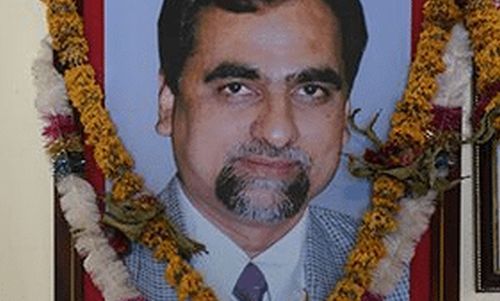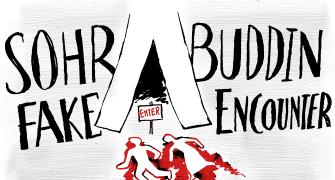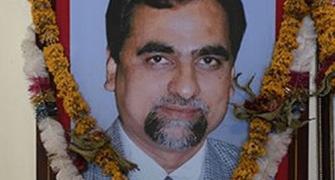
The top court said the judicial process will be reduced to a "charade" if the courts are burdened with such cases with extraneous reasons.
The Supreme Court on Thursday rejected the PILs seeking probe into the death of special Central Bureau of Investigation judge B H Loya, ruling that he had died of “natural causes”, as it held that the petitions were moved by political rivals to settle scores which was a serious attempt to scandalise the judiciary and obstruct the course of justice through a “frontal attack” on its independence.
Loya, who was hearing the high-profile Sohrabuddin Sheikh fake encounter case, had died of cardiac arrest in Nagpur on December 1, 2014 when he had gone to attend the wedding of a colleague’s daughter.
The apex court brought the curtains down on raging debate over his death, saying “the circumstances... which have been dealt with by this court in the judgment delivered today stands concluded”.
“We have come to the conclusion that there is absolutely no merit in the writ petitions. There is no reason for the court to doubt the clear and consistent statements of the four judicial officers.
“The documentary material on the record indicates that the death of Judge Loya was due to natural causes. There is no ground for the court to hold that there was reasonable suspicion about the cause or circumstances of death which would merit a further inquiry,” a bench headed by Chief Justice Dipak Misra said.
“We rest in the hope that the Bar of the nation is resilient to withstand such attempts on the judiciary. The judiciary must continue to perform its duty even if it is not to be palatable to some,” Justice D Y Chandrachud, writing the judgment for the bench which also had Justice A M Khanwilkar, said.
The bench said, “Business rivalries have to be resolved in a competitive market for goods and services. Political rivalries have to be resolved in the great hall of democracy when the electorate votes its representatives in and out of office.”
The CJI was attacked by four fellow apex court judges led by Justice J Chelameswar in an unprecedented presser on January 12 over allocation of cases and the hearing of the Loya matter was one of the bones of contention.
The apex court, in its 114-page verdict, took strong note of the submissions of senior lawyers Dushyant Dave, Indira Jaising and activist advocate Prashant Bhushan favouring a Special Investigation Team probe into the death on the ground that they wanted to save the independence of judiciary, and said their contentions warranted initiation of contempt proceedings. However, it chose not to proceed with the contempt proceedings.
It noted that a junior counsel, appearing for senior advocate V Giri representing a petitioner, went to the extent of urging that the judicial officers’ recorded statements were suspect.
Taking note of the “outrageous” submissions, the bench said, “Even the judges of this Bench, hearing the present proceedings, have not been spared from this vituperative assault on the judiciary”.
“But as the submissions have evolved, it has become clear that the petition is a veiled attempt to launch a frontal attack on the independence of the judiciary and to dilute the credibility of judicial institutions,” the court said.
“The conduct of the petitioners and the intervenors scandalises the process of the court and prima facie constitutes criminal contempt. However, on a dispassionate view of the matter, we have chosen not to initiate proceedings by way of criminal contempt if only not to give an impression that the litigants and the lawyers appearing for them have been subjected to an unequal battle with the authority of law.
It held that the petitions were misuse of public interest litigation, a serious matter of concern for the judicial process, and it would be a travesty of justice as the “resources of the legal system to be consumed by an avalanche of misdirected petitions purportedly filed in the public interest which, upon due scrutiny, are found to promote a personal, business or political agenda”.
“Courts protect the rule of law. There is a danger that the judicial process will be reduced to a charade if disputes beyond the ken of legal parameters occupy the judicial space,” the bench said.
The bench lent credence to the statements of four judges -- Shrikant Kulkarni, S M Modak, Vijay C Barde and R R Rathi-- who were with Loya on December 1, 2014 when he died at Nagpur.
“There is no basis whatsoever to make any imputation against the four officers of the state judiciary... The judges have spoken about the facts of the case as they could recall, with details,” the bench said, adding, “the statements ... have a ring of truth. They had nothing to conceal nor an axe to grind.”
The bench was also critical of submissions of Dave and Bhushan. While Dave had cast aspersions on two High Court judges and wanted to cross-examine four lower court ones, Bhushan had submitted that Justices Khanwilkar and Chandrachud should recuse from hearing the matter as they had been judges of the Bombay High Court and could have known the concerned judicial officers from there.
“By casting unfounded aspersions on the judicial officers who had accompanied Judge Loya, the petitioners have revealed the real motive of these proceedings which is to bring the judiciary into disrepute on the basis of scurrilous allegations,” the bench said, adding that judicial officers were “vulnerable to wanton attacks” on their independence and the top court would fail in its duty if it does not stand by them.








